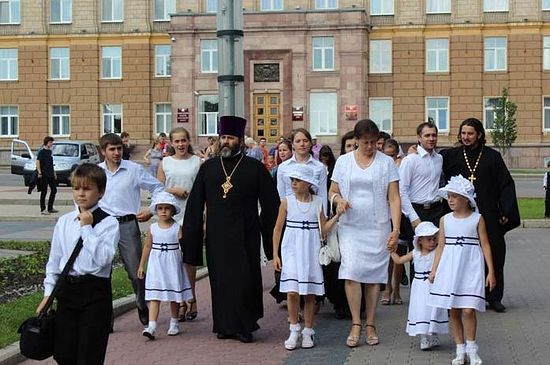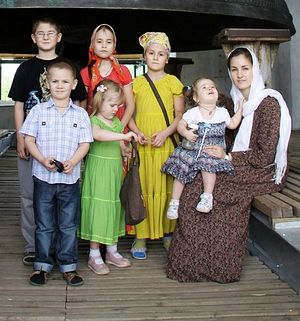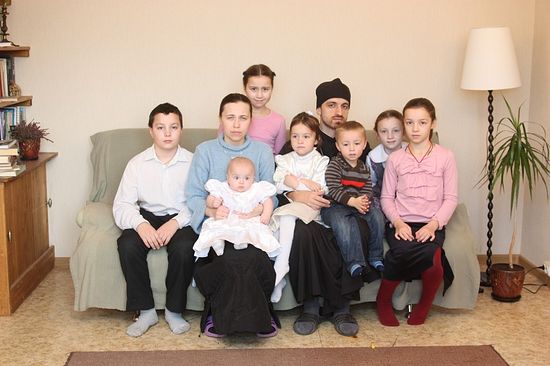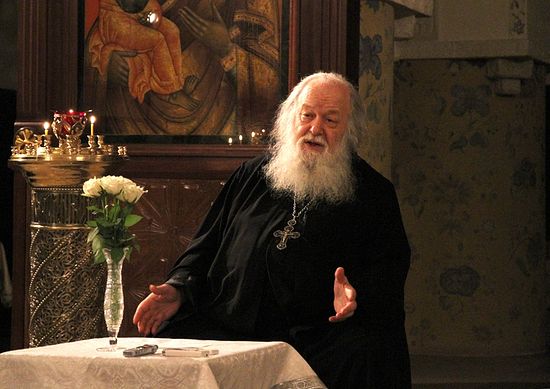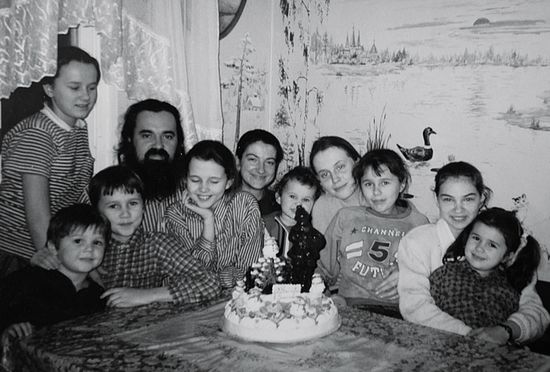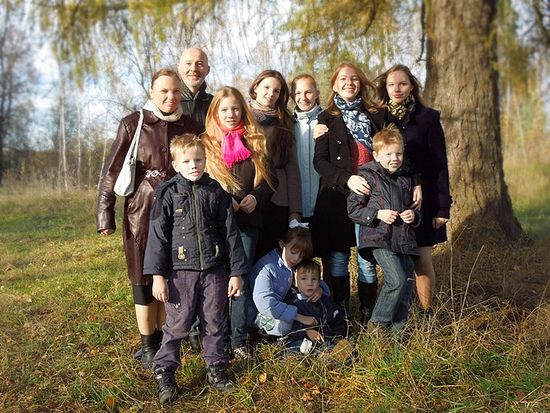When should small children be brought to church—at the beginning of the service, or just before communion? Most parents have run up against the fact that at a certain age, children are not able to concentrate on the services; they become capricious and distract other parishioners from a concentrated experience of the Divine services. What we do when this happens—become a source of trouble for those around you, or limit the time you and you children attend church? Some clergy and laywomen of the Russian Orthodox Church share their opinion on this subject: Archpriest John Osyak, Archpriest Valerian Krechetov, Priest Phillip Ilyashenko, Matushka (priest’s wife) Julia Artamonova, Liubov Beloborodova, and a mother of a large family, Natalia Yaltanskaya.
Archpriest John Osyak, dean of the Rostov and Novocherkask diocese, rector of the St. Seraphim and Holy Trinity churches in Rostov-on-the-Don:
—Children should be taken to church from the moment of conception in their mothers’ womb, and after the child is born, he should be regularly given Communion. After growing a little, he himself should run to church for services, because this will become a need for him; and if a child is not taken to church from early childhood, it will be hard later on to get him accustomed to prayer and order in the church.
Just because a child is rambunctious, is no a reason for not taking him to church. If a child gets capricious or tired, his mother should take him outside and walk with him around the churchyard until he calms down, and then enter the church again. The most important thing is to teach the child to pray. Then we will have a person to pray for us in our old age, and the child’s life will be ordered properly.
Going to church should be a festive occasion for the child, and therefore when you get ready to go to church, dress your child in beautiful clothes. After the service, set a festive table and do not neglect to talk with him about the services, the feast day, and about other little parishioners like himself.
“The best thing parents can do is to pray.”
Matushka Julia Artamonova, mother of six children:
—Whether the child will enjoy going to church or not depends not so much on the child himself but more upon the atmosphere in the family, and the parents’ own behavior. If the parents themselves rarely go to church, or go there only to socialize with friends, inadvertently or unconsciously showing that they are not going for prayer but only because “they have to”, then even if they take their child everyday it will have little effect. Sometimes it is the other way around: When parents zealously go to services, read the prayer rule every morning and evening with their children, and take them to the vigil services, one child might grow to like it, while another grows to hate it. Every case is individual—so individual that it is actually hard for me to say what is really the right thing to do.
I recall my own childhood: When I was unable to go to church on Sunday or to skip school to attend services for one of the twelve great feasts, I would have the feeling for a long time as if I hadn’t brushed my teeth, or had gone outside in a torn jacket. I feel that this is not the right approach to Liturgical life: you go fulfill your duty, cross out that item on the list, and that makes you a good kid. It is the same with morning and evening prayers. You can’t just read the prayers because you’re supposed to. It is no secret to many that you don’t necessary have to read them from start to finish—you can even read just one prayer. The main thing is that this really be prayer, and not just the fulfillment of some duty to someone—you don’t know who. But it is better to apply this indulgence to yourself and not to your children, because they don’t yet know what we know as we stand in prayer.
As a child I felt that I could not live without the church, but this was not the same thing as being without God. That is, God was with me at home, in my closed room, when I just felt like talking with Him; but church was my obligation, my habit, a show for others. By far not always was I with God in church; I spent more time trying to look pious for my parents and those around me. Many of those who knew us considered our family the most “Orthodox” of their acquaintances. Unlike me, my older brother would run to church to get there before the beginning of services, and pray for real. However, one of my younger brothers liked coming at the end. I myself didn’t care when I came—the beginning was fine, I had strong legs and was used to standing. Coming just before Communion was also fine—no need to stand so long. Was there prayer? I think there was, but as an exception. I became aware of this later, struggled with myself over church attendance out of habit, and it is still hard for me to stand in church, while for my older brother it is still easy.
My parents’ approach to us children was the same for all, but the results were different, because people are different. That is why it is impossible to say what is the best thing for everyone. Not long ago a friend told me about his childhood: He would pray before going to bed, and demons would rock a metal basinet that hung on the wall and slam the doors. At the advice of a priest he started sprinkling the corners of his rooms with holy water before going to bed, and the demons went away. This was just a little boy whose parents were not believers, who scolded him for running to church all the time. They let him sprinkle the corners of the room with holy water simply because they were tired of replacing the broken glass. You see—no one took this child to church, he found his own way. But another child might not even be dragged to church.
After becoming the mother of a large family I noticed the following: When we are not able to go to church every week the children find it hard to be in church. They wait until the services are over, try to play, to go outside for a stroll, sleep on the benches, and disturb others around them. But when we go every Sunday they become disciplined, and behave themselves better and better with each service. Then it becomes easier for me to bring them. At home I tell them about the services, about confession, and about everything that I think is good for them to know and understand at a given time. When I do this they go to church with great eagerness. Sometimes it is the other way around. If I am tired, irritated, and displeased with something—that is, obviously not ready for prayer—my children feel this. In this case it is better not to bring them to the beginning of the service, not to demand that they quietly stand and pray. The only thing I can say with absolute surety and without a doubt is that if a child is bothering those around him it is better to take him off to the side or out of the church altogether.
The best thing that parents can do is to pray. Children copy adults; and if we work on ourselves, if we change for the better in Christ, then children feel this right away, follow our example, and will try to live as we live. Only with our own lives can we explain to children what words do not suffice to explain. Elder Paisios said that his mother never forced any of her children to pray and did not even offer to pray with them—she just prayed all the time herself. Before taking bread out of the oven, she would cross herself. While getting out of bed in the morning she would first say a short prayer. And so on.
If parents go to church not just for show or to soothe their conscience but because they cannot live without God, then, as I see it, they can take their children along, but without forcing them.
If we go to prayer just for show without reaching by our lives for what it is that we want to train our child in by taking him to church, then it is just a waste of time. Children are very sensitive to fakery and react to it very sharply. And to the contrary: When they feel that their parents are concentrated, filled with gentleness, and radiate love before and (and after, of course) services, then this will become a normal, natural part of their inner lives, and not just the external carrying out of a rite. At first children don’t understand this, they don’t think about this; but every word and every gesture falls into their hearts like a seed, which later grows.
The Lord in any case does everything to direct what a person receives in childhood—even the negative—toward the right path, but we can through our own relationship simply obstruct our child from making the right decision and unite his will with the will of God.
The main thing is the goal, and the means can even have such an appearance that other people will say: “That’s not an Orthodox family at all!” or point their fingers at their temples and say, “Funny farm.” With every child and in every family, it is all individual. The most important thing is to love, and love itself will tell you what to do.
“A child can be in church for as long as he is capable of behaving himself quietly there.”
Priest Philip Ilyashenko, assistant dean of the history department of the St. Tikhon’s Orthodox Humanitarian University, doctoral candidate in history, father of nine children:
—When I was little, they would take me and my younger brothers and sisters to church and explain to us how we should behave there. When I grew up, I myself accustomed my children to going to church, as my parents did to me. In accordance with this, I accept the following practice as the norm: A child can be in church for as long as he is capable of behaving himself quietly there.
Many parents of today’s children found their faith not in childhood, but at a conscious age, and therefore they have no experience of going to church as children. Such parents think that if in their own burning zeal they are able to stand for several hours in monastery or Great Lenten services their children should be able to do the same. Of course, it is a good thing to bring a child to God, but a child is not an adult; he perceives time, effort, and impressions received in a completely different way.
Our spiritual father, Archpriest Vladimir Vorobiev, always told us that the surest way to raise an atheist is to “drag” him as a child to church and force him to stand through not only the Liturgy, but also long evening services. To be filled with tender feelings when a child stands in church like a lighted candle but anguished when this doesn’t happen is something I consider essentially wrong, because in the future, when that child grows up, he most likely will stop going to church.
I don’t see anything wrong with little children sitting at their mother’s feet or walking into the narthex. It is bad when a child looks at the church as a place where he can play and misbehave the whole time he is there. It should made perfectly clear to the child that it is forbidden to play in church because the church is something special and mysterious; it is the House where a meeting takes place with God. But we shouldn’t worry if a child cannot tolerate church more that five or ten minutes. It is normal for a child to want to run and interact with people around him, to get to know a new space, and stare at the interesting little candle flames. Having stood for five minutes, then received Communion, the child can calmly go with God to his home to do his childish things: eat, play, sleep, and so on.
I think that every parent feels on a subconscious level how much time his child can spend quietly at the services. There is no universal recipe that might precisely answer our question of when and for how long we should bring our children to church. Every parent should understand for his or herself how much time his child can calmly spend in church. In gradually bringing their children to church, parents are strengthened in their hope that when they grow up, they will not want to leave it.
“A small child does not have to be taken right away to a full service.”
Archpriest Valerian Krechetov, rector of the church of the Protection of the Mother of God in Akulovo (Moscow diocese):
—Every child is an individual. One will begin earlier to understand what church is, another later. A little while after her youngest son’s birth, my daughter decided to fast. And what do you think? The boy refused to take milk. Another child might not refuse it under the same circumstances. This speaks to the fact that all people are different. A different approach has to be taken toward each person. A small child does not have to be taken right away to a full service. Everything should be done gradually. At first children can be taken only to Communion, and then their time in church can be increased. On the other hand, children cannot be raised without some coercion. But we need to coerce them within reason, so that they will not later be repelled by what they were forced to do.
“It is important to inculcate in children a reverential relationship for God’s house.”
Matushka Liubov Beloborodova, mother of two, daughter of Archpriest Feodor Sokolov.
—When they start to have children, the parents’ life changes completely; they no longer belong only to each other, and many of their activities are tailored to their children. The same happens with regard to church attendance. It is always hard to see how tortured children can be when they are brought to the beginning of services. Their parents are tortured with them. Of course, adults want to be able to stand quietly and pray as they did before, but when we have an infant in arms, when think more about him than about ourselves. A nursing infant has his own regime, and so with these little ones we try to come directly to Communion. But when a child has grown a little, we can come earlier. We start showing him the icons, for example; we come up to the icon of St. Seraphim and whisper in the child’s ear, “There’s Father Seraphim, who fed the beat, remember?” We direct the child’s attention to how the choir sings, what the priest is doing (or not doing) right now, how the candles are burning. To a five- or six-year-old we can begin explaining the importance of the Eucharistic canon, how important it is not to run around but to stand during the Cherubic Hymn and Anaphora, what is happening at that moment in the altar, what these hymns mean. Naturally, everything needs to be explained in a “child’s language” and not in theological terms. We can and should discuss with children how they are supposed to behave themselves in church, what parts of the service they should pay special attention to. It is psychologically easier for children when they are forewarned about what is going to happen, how much time they will spend in church, and what the adults expect of them. I remember how my mother and grandmother placed us at the front of the church and told us to carefully watch the deacon during the ectenia: When he crosses himself, we cross ourselves, and when he bows, we bow. Sometimes it seems that we fall out of church life because of our children, and can’t remember the last time we were able to pray calmly. In that case it is better to leave the children at home with grandmother or dad, and just go to church alone to restore our emotional strength. This is very important for mothers!
How should we inculcate love for divine services? Here is needed your love, patience, and strangely enough, a lot of creativity and imagination. Children really love it when someone tells them about everything graphically and colorfully. This is how we should talk about God, the saints, and the Church. Our mother often sat us down of evenings and told us about the saints and their miracles, or retold the meaning of the upcoming feasts. And if Pascha or Christmas were coming up—lots of time was given to this! Then there would be Christmas plays, learning poems and carols, cleaning the apartment, many discussions of moments in the feast and its meaning, crafts, cooking, and much else. We participated in all of this, no matter what our age. Children need to be given the opportunity to make something themselves for the feast, or as my mother use to say, to meet the Lord! All of this cultivates love not only for going to church, but it is also how family traditions come into being; and these are a strong foundation for the family!
Church is not a mundane thing; it is not a place that we can just thoughtlessly step into after a stroll. There should be different clothing, different behavior. If you are getting ready to go to Communion tomorrow you can talk with the child about how tomorrow morning he will get up a little earlier and to to church, he will take Communion, how he will open his little mouth, how he will hold his hands, how good he will behave himself. With children who are a little older (seven and above) you can read the more understandable prayers before Communion, discuss the clothes they will wear to church, which they can prepare the evening before. Warn them that they must keep a clean appearance and behave themselves quietly. This whole stage of preparation is important for children—they can prepare themselves beforehand for going to church, and it will become habitual for them to get ready both outwardly and inwardly.
These days, children are surrounded by very many temptations and bad company, which makes us think about how to keep the child in the family, so that he won’t follow after those temptations. I do not yet have experience in this because my girls are still small. But looking at other families I can say that wherever the family traditions are kept, where parents and children continue to give each other a lot of time, care, and love, all hardships are overcome and everything settles into place. My mother, who has gone a long way and experienced much, says that it is very good when boys and girls have no time for silliness; that is, when they are busy every minute: sport, music, drawing—each to his own ability. It is very important that the father find time for his sons: fishing, mushroom hunting, campfires. During the time they spend together a child opens up to his parents, his soul opens up, and a special bond is established. You become not just and instructor but also a friend, whom he can fully trust. Mothers spend more time with their daughters: cooking together (happily, with music and conversation), walks, and even shopping, teaching home economics. In the evenings everyone comes together for tea, where they all talk over their news, and decide family matters. Teatime is a release, when you can relax after the workday or week.
In the teenage years it is important not to overdo it, to find a golden mean Give the child even more of your time, learn about his problems, his friends, and interests. Then those values that were cultivated in the child from birth will remain with him. The children will be in the family, and the family is a mini Church.
“If a child is used to respecting the prayers of his elders at home, then there should not be any major problems in church.”
Natalia Yaltanskaya, mother of nine children:
—If you love God, if His presence is important to you and you strive for Him, if your life is filled with meaning only through God and thanks to Him, then won’t you always long to enter His house, where He lovingly calls you? Besides that, each one of us knows that love is work, and we have to apply no small effort in order to be worthy of this love. Then the road to the church will not be a burdensome duty, not a road of tears but a road of joy. But even when a grown person forces himself to rise from his bed and go to the services, there is nothing disgraceful in that. Crises happen at any age. But the joy of overcoming, we hope, is known to all.
This is all true, but we all want specific recipes. Thus, naturally, all members of the family long to go to church for the Vespers and Matins services, and not only to Communion and the anointing. In general it seems to us that a young child will not necessary become capricious and bother the adults. We will even dare to day that a child feels good next to his dear ones in any place, and he doesn’t have to concentrate on the services at all. If a child is use to respecting the prayers of his elders at home, then there should not be any major problems in church. There are many options for overcoming boredom: sleeping in daddy’s arms, looking at books, walking around with older sister, looking at the candles, walking around the church and making sure that everything is in order, or drawing pictures at the desk for prayer lists. We consider as an unacceptable option any herds of children running around the church or narthex, and, if you please, children’s screaming in mother’s arms, “no matter what.” It sometimes happens that it is too crowed in the church, or so quiet that every breath can be heard. What to do? You could look for a church that is more accommodating to families. And, of course, a mother, just like other members of the family, will find the opportunity to pray only at church, without her child. She might even be able to leave for a few days in order to renew her emotional peace and patch the rips in her spiritual life.
It seems unacceptable to us to make going to church expressly attractive to a child. We really do love praying in church, and we hope that our children will, too. It must be said that in our parish at least, the life of the children’s group is even richer than the adults’, and therefore our children spend more time in church outside of services than we do.
We do not consider it a horror when grown children stop going to church. This is natural to a certain extent. The child was baptized as an infant, and wasn’t asked. Daily prayer together, festal and Sunday services, the habit of turning to God for needs both petty and great—all of this will not necessarily lead to habit. If a childhood was warmed by love and illumined by parental faith, then in adulthood the person will know where to return after the storms and deprivations unavoidable in this world. And then his return to faith will be conscious, and his coming to God will be his own choice, not forced on him, and no longer just “out of obedience.” In fact, this conscious Christianity will be the triumph of our education. After all, coming to church is not a goal in itself.

